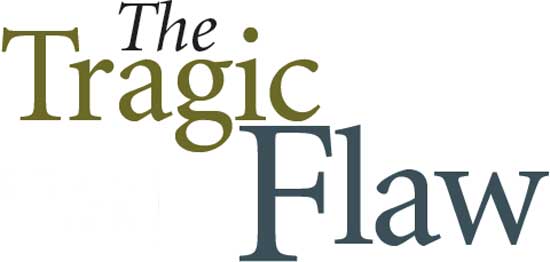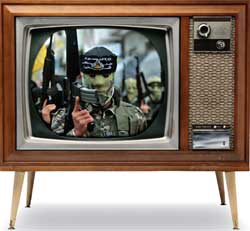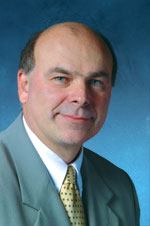The Tragic Flaw
Lincoln E. Steed September/October 2006
Getting your Trinity Audio player ready...

Just a few days ago I walked alongside my father as hospital orderlies wheeled him into the operating room for rather serious surgery*. He had been very ill for a week or two and I don't think he had much sense of current world events. But his mind was active and he couldn't stop talking about places and people from the past.
He could still laugh about the time in Nice, France, when he persuaded a petulant Jacques Cousteau to rejoin the International Drug Prevention Convention which my father had organized. The explorer re-entered the hall and promptly gave his speech—in English—to the largely French audience. "What an insult," hissed one of them. Freedom Fries, anyone!
As we covered those few yards of hospital vinyl, my dad was reliving the contacts of decades. Many of those contacts were in the Middle East. The same Middle East in flames again on many television screens in rooms throughout that hospital.

I remember taking some of those trips with him. I remember standing on one of the peaks that surround Kabul, Afghanistan, and looking down on the city and toward the Intercontinental Hotel where we would soon hold another International Conference. That was way back before the Communist puppet regimes and the horrors of the Taliban, but it struck me as a world apart—to be understood only in the mirror of its culture and religion. And I still remember the cascade of small pebbles against the car as we drove along the road past hostile children.
I remember walking down one of the main boulevards in Tehran, Iran. There were huge portraits of the Shah hanging from many buildings. But it seemed an overlay on the real culture of the city. I remember more clearly the handholding, giggling crowds of teenage boys who followed us at a not too discreet distance—I think my sister was the main attraction for them! I remember pausing out front of the U.S. Embassy gates and looking in and away to the main building; remote and silent, and soon to be occupied by student activists and hostages. And I remember the clear yet wavering call of the Muezzin to prayers.
I remember many of the sessions of those conferences. Hundreds of delegates gathered from across the known and not so known world. (What was it that Mark Twain wrote about wars being God's way of teaching Americans geography?) I particularly remember the Saudis. Often dressed in flowing robes, they always projected an air of earnest religious fervor. No politics were ever spoken, but the conversation was always of moral reform—always on our shared goal of educating people away from the destructive habits of drug and alcohol use. I noticed that the logic of their argument derived from a spiritual goal and not from a public health point of view. And, of course, as Christians, we had much the same inner call to help our fellow men.
I particularly remember one public meeting, when there was a discussion about where to hold the next conference. Among other offers there was a strong lobby from the Arab nations to hold it in their region—Saudi Arabia and Kuwait were the two locations put forward. In the to and fro, pro and con of the debate, some questioned the logistics and expense of having it in those places. But the Saudis and Kuwaitis were insistent that it would work and that we would have the full support of the civil authorities. And I will never forget the clincher argument given by one of the government ministers for Kuwait: "Don't worry," he laughingly said, "there is no such thing as separation of church and state in our countries, so it will be easy to do." We all smiled, but in the years since, and since the war on terrorism has picked up, I have seen this as far more than something to smile about. It is the tragic flaw of the Islamic world. And the beckoning horror that the Christian West must avoid as it responds.
As the recent situation in the Middle East blew out of any semblance of sanity to non-political outside observers, a colleague of mine sent an e-mail in which he wondered if this might be the beginning of the Biblical battle of Armageddon. Probably not, I told him, but it got me thinking.
It's fine to read such things in holy writ and interpret world events in light of prophecy. It's intended that such musings lead the reader to a closer personal faith dedication. Where things get badly out of sync for all mankind is when such musings become elements of public policy.
When Iranian leaders see conflict with Israel and the United States as a necessary precursor to the hoped appearance of the Fifth Imam, we all have trouble. When and if the United States sees Biblical Armageddon as inevitable and a necessary prelude to world peace, we also have trouble.
The reality is that in both the "Christian" West and the Islamic world there are many adherents who see apocalyptic, bloody confrontation as necessary passages to their heavenly peace. Whether right or wrong in their interpretation, such thinking allied to civil power can bring only the Crusades, the Inquisition or the human apocalypse.
The last time the West fell prey to religious incitement to use secular power in the Middle East the result was nearly two centuries of military Crusades—or "wars of the Cross." They are well remembered in the Middle East—and in Rome too, to judge by the late Pope John Paul II apology for the sack of Constantinople. (A perfect illustration of how religious wars have a habit of turning back upon themselves.) And the Islamic world has been stirred before by the spirit of conquest that took it to the gates of Vienna and threatened the survival of Christian Europe.
I believe that the rapid rise of religious extremism is foretold in Biblical prophecy. By extremism I am including all the major faiths. After all, let's not delude ourselves, a hard edged militant "Christianity" that yearns for political power is at our own door. But, I can't expect that every reader of Liberty
will agree with me. We live in a free society and my view of religious liberty, which I also derive from the Bible, has to allow you equal right to believe what you want.
What I must insist upon and enlist your aid in maintaining is a principle: the separation of church and state. It is biblical. It is historically proven. It is Constitutionally mandated.
Look into the flames of religious conflict. Look into the cauldron of post 9/11 paranoia. Tell me if there is any hope without a reassertion of the separation of church and state. Without it we have the Tragic Flaw writ large on a wall in blood red characters.


*Ernest H. J. Steed, the editor's father and a pioneer in communicating faith-based drug prevention ideals to governments around the globe, died in Orlando, Florida, July 25, 2006.
Article Author: Lincoln E. Steed
Lincoln E. Steed is the editor of Liberty magazine, a 200,000 circulation religious liberty journal which is distributed to political leaders, judiciary, lawyers and other thought leaders in North America. He is additionally the host of the weekly 3ABN television show "The Liberty Insider," and the radio program "Lifequest Liberty."